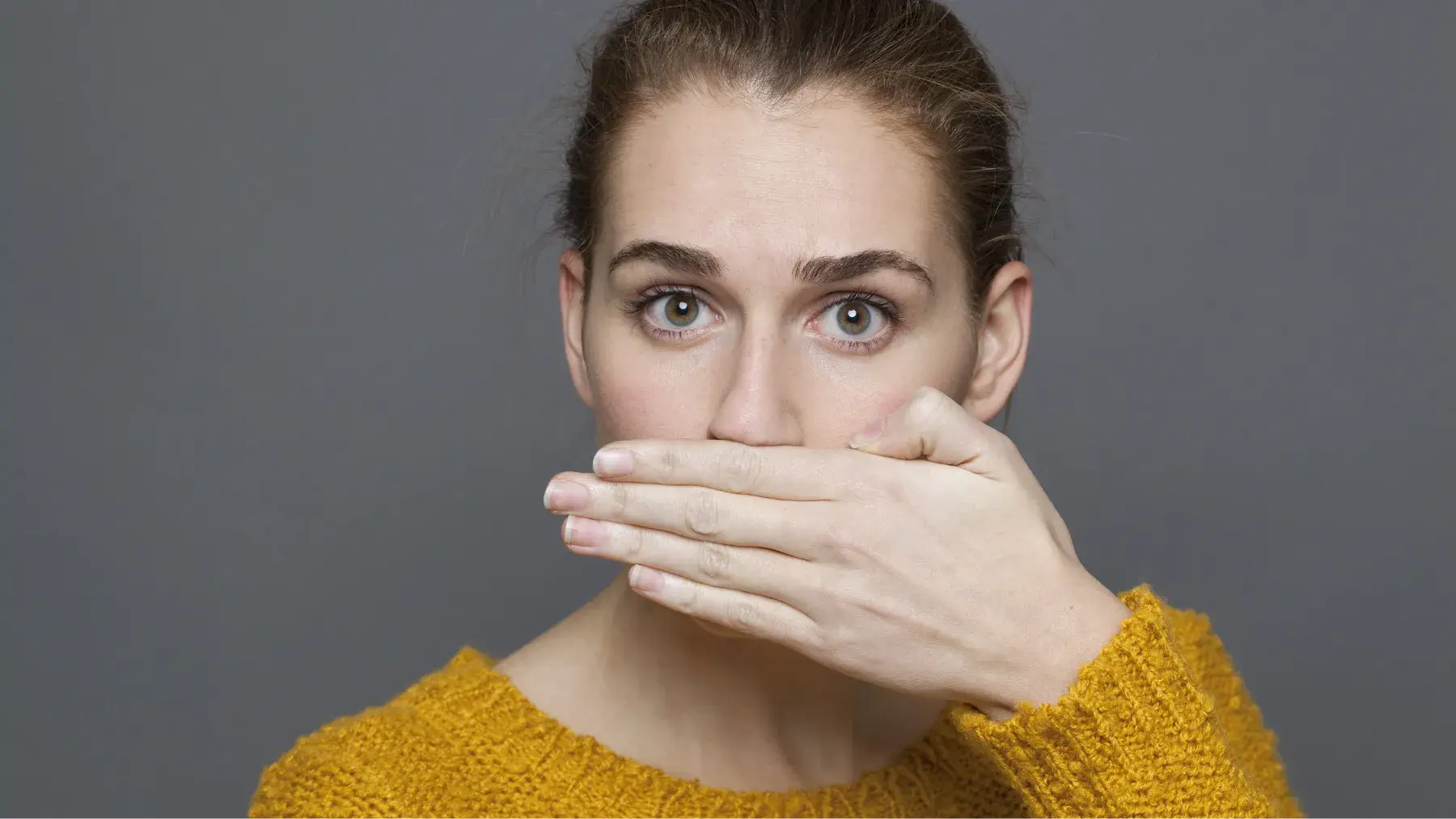Dry Mouth & Bad Breath: Causes, Symptoms, and Prevention
If you’ve ever felt nervous about speaking, or tried swallowing a handful of chips without water, you’ve probably experienced the feeling of dry “cotton” mouth. But if your mouth is regularly dry and not creating enough saliva, you could be suffering from dry mouth (xerostomia).
Xerostomia is the clinical term for not having enough saliva to keep the mouth wet. What’s wrong with having insufficient saliva, you may ask? For one, saliva serves all sorts of critical functions in the body, like moistening and breaking down food, washing away food particles from the teeth and gums, and maintaining tooth strength and fighting decay.1
But if your mouth is dry and lacking saliva, it can also have some less-than-desirable social consequences. That’s because of the connection between saliva and bad breath. When your body produces sufficient saliva, it can help to keep your mouth clean and free of debris and odor-causing bacteria. When you have insufficient saliva, that stink-causing bacteria can develop and your breath may start to smell. Hence, one of the leading bad breath causes is dry mouth.2
Still, before you dial up the dentist complaining of dry mouth disease, read ahead to learn about other potential causes of bad breath, as well as some at-home dry mouth treatments.
What Is Dry Mouth
Xerostomia, dry mouth, or cotton mouth all refer to a sensation of oral dryness caused by not enough saliva in the mouth. If you find yourself asking, why do I have dry mouth? consider the following:
What causes dry mouth?
There are a variety of potential xerostomia causes:1, 3
Side effects of certain medications
Dehydration
Certain diseases
Radiation or chemotherapy
Nerve damage
Snoring and mouth breathing (a leading cause of dry mouth at night)
Use of tobacco, alcohol, or marijuana
What are the symptoms of dry mouth?
Some leading dryness of mouth symptoms include:
Oral burning or sore throat
A dry feeling in throat
Diminished or altered taste
Difficulty swallowing dry foods like crackers
A sensation of thickened saliva
Sensitivity to acidic or spicy foods
Cracked lips
Bad breath
Regardless of your particular cotton mouth causes, the consequences of dry mouth can be uncomfortable to live with.4
The Link Between Dry Mouth and Bad Breath
How does dry mouth contribute to bad breath?
One of the primary symptoms associated with dry mouth is halitosis, more commonly known as bad breath. Bad breath can arise as a result of decreased salivary flow, and the subsequent build-up of bacteria in the oral cavity. In brief, when your mouth is not properly cleansed by saliva, foul-smelling compounds are produced by bacteria, causing your breath to reek.2
What are the other causes of bad breath?
Dry mouth is not the only cause of bad breath. Other bad breath causes include:2
Poor oral hygiene
Fixed orthodontic appliances
Tooth decay and cavities (oral caries)
Ear, nose, and throat conditions
Gastrointestinal disorders
Diabetes, liver disease, or kidney disease
Dehydration
Advanced age
Certain types of food, such as garlic, onion, coffee, and dairy products
Smoking
How to Manage Dry Mouth
If you’re dealing with a bout of dry mouth, don’t fret. There are plenty of home remedies for dry mouth, as well as practical steps you can take that will act as xerostomia treatments.
Lifestyle changes
Making habitual changes can be an effective way to stop mouth dryness. Consider the following steps and home remedies for dry mouth:
Take frequent sips of water
Chew sugar-free gum or suck on sugar-free candy to stimulate saliva production
Avoid caffeine, tobacco, alcohol, and dry or hard-to-chew foods.4, 5
Over-the-counter remedies
Other xerostomia treatments include over-the-counter solutions like specialized mouthwashes, sprays, lozenges, and gels that may be indicated before meals and as needed.4
Prescription options
If home remedies and lifestyle changes fail to mitigate your dry mouth symptoms, reach out to a doctor, as your ongoing symptoms could be related to a more chronic condition. Consider asking your doctor about FDA-approved medications for managing xerostomia.
Preventing Dry Mouth
Concerned about developing dry-mouth? Here are some ways you can prevent your mouth from drying out, and protect against bad breath.
Tips for staying hydrated throughout the day
A key way to keep your mouth moist and to prevent bad breath is consistent hydration. How can you ensure you are intaking enough water throughout the day?
Drink water with meals
Drink water all throughout an exercise session
Keep a bottle of water nearby, and reach for it when you feel thirsty throughout the day
Add a few drops of flavor to your water with fruits like lemon, lime, or orange. You can also add sugar-free powders for additional flavor.
Try to add fruits and vegetables with high water content into your daily diet. Watermelon, cucumber, lettuce and celery all have high water content.6
Avoiding habits that worsen dry mouth
You may be unwittingly contributing to your dry mouth with certain habits. Some habits that can make dry mouth worse include:
Consuming drinks with caffeine, such as coffee, tea, and some sodas, as caffeine can dry out the mouth
Consuming tobacco or alcohol.6
Discussing concerns with your doctor
If you are already incorporating good habits into your daily routine, but still find yourself struggling with dry mouth, consider the causes of dry mouth at night. A dry bedroom can cause your mouth to become arid, especially if you sleep with your mouth open. You can help prevent dry mouth while sleeping by using a cool humidifier in your bedroom.4
Still, persistent symptoms that don’t seem to get better might be cause for concern. Reach out to a doctor if you have ongoing symptoms of dry mouth, and discuss possible underlying conditions and potential solutions.
LISTERINE® for Bad Breath
One way to help with bad breath is with a daily mouthwash routine. LISTERINE® makes a variety of mouthwashes that work as dependable defenses against unpleasant breath.
LISTERINE® Clinical Solutions Breath Defense
LISTERINE® Clinical Solutions Breath Defense Alcohol-Free Mouthwash for Bad Breath is an ideal mouthwash for people struggling with bad breath. Featuring odor-neutralizing technology, this alcohol-free mouthwash kills bad breath germs, purifies odor molecules, and helps prevents bad breath. It provides triple-action bad breath defense for 24 hours, when used twice daily, by killing malodor-causing bacteria, trapping malodor, and purifying malodor.
Other LISTERINE® products for bad breath
LISTERINE® offers other mouthwash products that can help with bad breath:
LISTERINE® TOTAL CARE Anticavity Fluoride Mouthwash strengthens teeth and freshens breath.
LISTERINE® GUM THERAPY Glacier Mint Antiplaque & Antigingivitis Mouthwash helps reverse signs of early gum disease, killing bad breath germs for fresher breath.
What is the difference between dry mouth and dehydration?
Dehydration could be a cause of dry mouth, but they are not the same thing. Dehydration results when water loss from the body exceeds water replacement, disrupting the body’s ability to carry out necessary processes.7
Dry mouth, meanwhile, occurs when you do not create enough saliva to keep your mouth sufficiently wet. This could be caused by dehydration or by one of the other reasons noted above.
Can dry mouth be a sign of something serious?
It is possible that dry mouth is a symptom of a more serious condition, though it is not necessarily the case. If you are suffering from frequent dry mouth that does not improve, reach out to a doctor and describe any other symptoms you may be experiencing.4
References:
“Dry Mouth.” NIH National Institute of Dental and Craniofacial Research. https://www.nidcr.nih.gov/health-info/dry-mouth
Khounganian, Rita M et al, “Causes and Management of Halitosis: A Narrative Review.” PubMed Central (NIH.gov) https://pmc.ncbi.nlm.nih.gov/articles/PMC10506127/
“Dry Mouth (Xerostomia).” Cleveland Clinic. https://my.clevelandclinic.org/health/diseases/10902-dry-mouth-xerostomia
Talha, Bilal & Swarnkar, Suman A. “Xerostomia.” NIH National Library of Medicine. https://www.ncbi.nlm.nih.gov/books/NBK545287/
“Oral Health & Aging.” NIH National Institute of Dental and Craniofacial Research. https://www.nidcr.nih.gov/sites/default/files/2023-12/dry-mouth-and-older-adults.pdf
“Tips for Drinking More Water.” Mayo Clinic. https://www.mayoclinichealthsystem.org/hometown-health/speaking-of-health/tips-for-drinking-more-water
Taylor, Kory et al. “Adult Dehydration.” NIH National Library of Medicine. https://www.ncbi.nlm.nih.gov/books/NBK555956/




